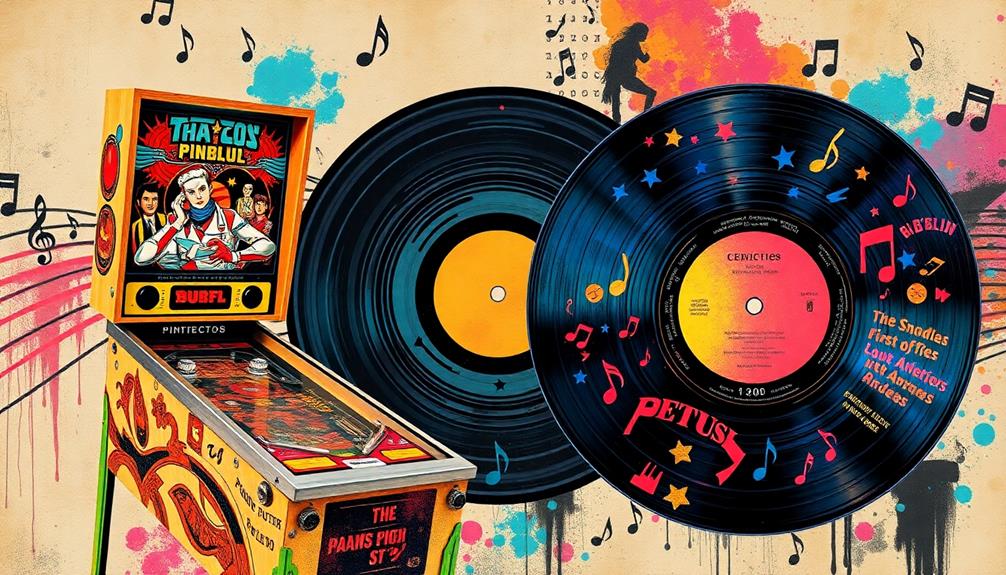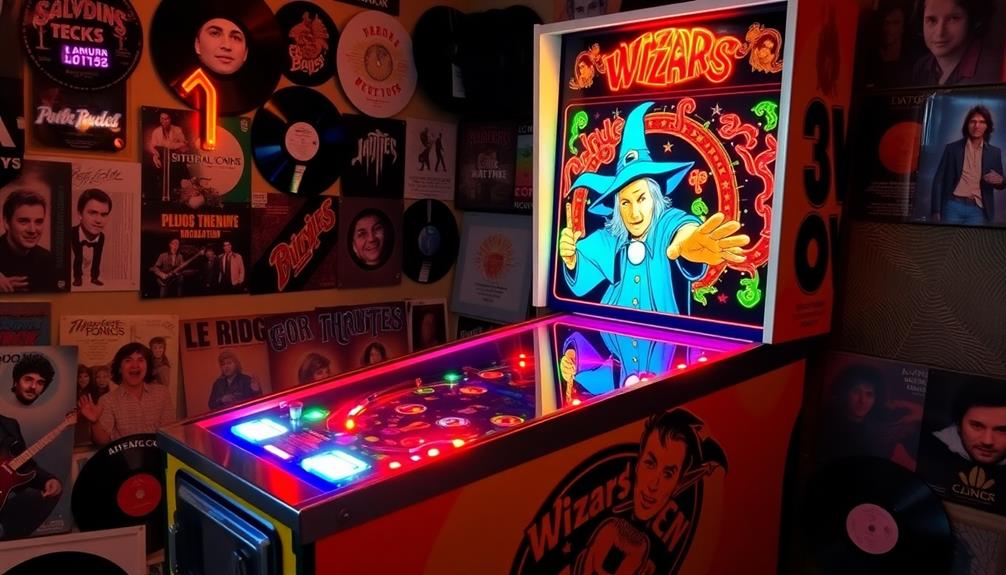“Pinball Wizard” stands out as a track from The Who’s revolutionary rock opera, “Tommy.” The album, released on May 19, 1969, narrates the captivating tale of Tommy Walker. The song skillfully merges rock music with storytelling, captivating audiences and becoming a cultural landmark. Recorded in the early months of 1969, it swiftly rose on the music charts, showcasing its infectious appeal. The song’s themes of change and victory deeply resonate with fans, contributing to its lasting influence. Delve deeper to discover more intriguing insights about the album and its impact on the history of rock music.
Key Takeaways
- "Pinball Wizard" is featured on The Who's double album titled "Tommy," released on May 19, 1969.
- The song was developed during the recording sessions for the "Tommy" album, which began in September 1968.
- "Pinball Wizard" was released as a single on March 22, 1969, prior to the full album's release.
- The track showcases the energetic sound and storytelling style that characterizes the "Tommy" rock opera.
- "Tommy" remains a landmark album in rock history, significantly propelled by the success of "Pinball Wizard."
Overview of "Tommy"
The double album "Tommy" by The Who isn't just a collection of songs; it's a groundbreaking rock opera that tells the enthralling story of Tommy Walker. Released on May 19, 1969, this album revolutionized how rock music could tell a story, weaving together themes of spirituality and personal transformation.
Conceptualized by guitarist Pete Townshend, "Tommy" reflects his admiration for the teachings of Meher Baba, guiding you through Tommy's journey to spiritual leadership.
Pinball's history is also pivotal, as it highlights how the game became a significant cultural phenomenon during the time "Tommy" was released. The album's production began in September 1968 and took six months to complete, emphasizing a meticulously arranged and cohesive narrative.
One of the standout tracks, "Pinball Wizard," captures a pivotal moment in Tommy's story, showcasing his extraordinary talent for pinball. This song not only provides insight into Tommy's character but also serves as a cultural touchstone, illustrating how music can connect deeply with listeners.
Upon release, "Tommy" received critical acclaim, solidifying The Who's place in rock history. Its innovative approach to storytelling and music has left a lasting impact, influencing countless artists and shaping the future of rock operas.
If you haven't yet explored "Tommy," you're missing a transformative experience in music history.
Creation of "Pinball Wizard"

In February 1969, "Pinball Wizard" took shape at Morgan Studios in Willesden, following a suggestion from music critic Nik Cohn. Significantly, the creative process behind the song parallels the dynamic relationships often seen in celebrity culture, such as the friendly post-divorce connection between Jennifer Aniston and Brad Pitt.
Pete Townshend wrote the song as a response to Cohn's idea, even though he initially doubted its potential for success. To prove himself wrong, he created a quick demo that blended baroque and flamenco guitar styles, which surprisingly garnered a positive reaction from the rest of The Who.
This initial spark led to the song's further development as part of The Who's ambitious rock opera, "Tommy." The creation of "Pinball Wizard" was essential, as it became one of the standout tracks from the album. The band recorded the song on February 7, 1969, and it marked a significant moment in their creative journey.
As "Pinball Wizard" evolved, it not only showcased Townshend's songwriting prowess but also set the stage for "Tommy" to become a monumental work in The Who's discography. The song's infectious energy and unique sound played an important role in capturing the audience's attention, ultimately contributing to the album's success upon its release in May 1969.
Recording and Production Details

Recording "Pinball Wizard" at Morgan Studios was a whirlwind experience for The Who, capturing the band's raw energy and innovation. Held on February 7, 1969, the recording session became a demonstration of Pete Townshend's creative prowess. Inspired by a suggestion from music critic Nik Cohn, Townshend crafted the song quickly, showcasing his ability to produce impactful music in a short timeframe.
The vibrant atmosphere of the studio echoed the essence of a perfect day, much like the feelings evoked in Blue Skies and Lemonade, adding to the band's creative synergy.
During the session, initial demos featured baroque and flamenco guitar styles, which caught the attention of the band. This experimentation led to a positive response, allowing them to refine the sound that would ultimately define "Pinball Wizard."
The studio environment buzzed with excitement as the band channeled their collective energy into the recording, ensuring that the final product resonated with listeners.
The song's production was efficient, demonstrating The Who's commitment to capturing their vibrant spirit. As they worked through the layers, they managed to create a dynamic track that would later be featured on the rock opera album "Tommy," released on May 19, 1969.
This recording session not only solidified "Pinball Wizard" as a classic but also showcased the band's innovative approach to music.
Chart Performance and Reception

"Pinball Wizard" made a significant impact on the charts shortly after its release, peaking at No. 4 in the UK and reaching No. 19 in the US.
Its connection to the gaming world resonates with fans, especially given the growing popularity of best arcade machines in home game rooms.
While it faced tough competition from iconic songs like The Beatles' "Get Back," it still garnered a mix of reviews upon its debut.
Despite this, its lasting appeal has solidified its status as one of The Who's most celebrated tracks.
Chart Success Overview
The success of "Pinball Wizard" on the charts showcases its significant impact during its release. When it hit the UK on March 22, 1969, the track quickly climbed to No. 4 by May 3. Just two weeks later, it made its debut in the US, peaking at No. 19 on the Billboard chart. Competing against iconic songs like The Beatles' "Get Back" and Mary Hopkin's "Goodbye," "Pinball Wizard" still managed to capture listeners' hearts.
The thrill of the pinball machine metaphor resonated with fans and highlighted the song's charm, similar to how different zodiac signs influence attractiveness. Its infectious energy fueled countless sing-alongs. The track's timeless appeal solidified its place in rock history.
Though initial reviews were mixed, the enduring popularity of "Pinball Wizard" proves its chart success was no fluke. Over the decades, it has evolved into one of The Who's most recognized tracks, frequently featured in their live performances and various compilations.
This longevity highlights not only its catchy melody but also the song's cultural significance, ensuring that it continues to inspire new generations of music lovers.
Critical Acclaim Highlights
With its dynamic blend of rock and storytelling, "Pinball Wizard" quickly garnered critical acclaim, becoming a standout track from The Who's rock opera "Tommy." Released in 1969, the song not only showcased the band's innovative sound but also captured the imagination of audiences and critics alike.
The song's chart performance reflected its popularity, peaking at No. 4 in the UK and No. 19 in the US. Its success helped elevate "Tommy," which initially struggled in sales but eventually climbed to No. 2 in Britain. Critics praised "Pinball Wizard" for its catchy melodies and vibrant instrumentation, solidifying The Who's place in rock history.
Here's a quick look at its chart performance:
| Chart | Peak Position |
|---|---|
| UK Singles | No. 4 |
| US Billboard | No. 19 |
| Tommy Album | No. 2 |
| Release Date | March 7, 1969 |
| Album Release | May 19, 1969 |
"Pinball Wizard" not only stands as a proof of The Who's musical prowess but also as a cultural milestone, leaving an indelible mark on rock music's evolution.
Cultural Impact and Legacy

Emerging from the depths of rock opera, "Pinball Wizard" has made an indelible mark on music and culture since its release. This pivotal track from The Who's 1969 album "Tommy" explores themes of personal transformation and spirituality, resonating deeply with audiences.
Its cultural significance is undeniable, as it not only solidified "Tommy" as a cornerstone of rock music but also showcased the power of storytelling in songs, similar to the way Nike Tech dominates sneaker culture by merging innovation with style.
Consider the emotions evoked by "Pinball Wizard":
- The thrill of success against all odds.
- The journey of self-discovery and redemption.
- The exhilaration of live performances that unite fans.
Over five decades, "Pinball Wizard" has influenced countless artists and genres, becoming a staple in classic rock playlists. Its infectious energy and profound lyrics guarantee that it remains relevant today, often featured in live performances and covers. The track’s dynamic storytelling and explosive instrumentals have cemented its place as a cultural touchstone that resonates across generations. Exploring themes of triumph and extraordinary talent, the pinball wizard song meaning delves into the perception of greatness through unexpected avenues. This enduring appeal ensures that the song’s legacy will continue to thrive for years to come.
The song's impact is felt not just in music but in pop culture, symbolizing a generation's struggle and triumph. As you listen to "Pinball Wizard," you tap into a legacy that continues to inspire and uplift, making it a timeless anthem in the rock genre.
Notable Covers and Adaptations

Notable covers and adaptations of "Pinball Wizard" reflect the song's enduring appeal across generations. One of the most significant renditions came from Elton John, who recorded a version for the film adaptation of *Tommy*. His unique piano interpretation not only showcased his musical prowess but also helped introduce the classic to a new audience.
Released in the UK on March 7, 1969, the original by The Who peaked at No. 4 on the charts, and Elton's cover became a major hit in both the UK and the US. The song's rich history and cultural significance can be likened to the benefits of antioxidants in juice, which have been celebrated for promoting overall health.
Elton John's version stands out as a notable part of his discography, emphasizing his versatility and talent for reinterpreting rock classics. His live performances of "Pinball Wizard" continue to resonate with fans, highlighting the song's enduring legacy.
Additionally, the song has been celebrated in various compilations, reinforcing its cultural significance in rock music history. Kit Lambert, as the producer, played a vital role in shaping the original track, ensuring its lasting impact.
Through these adaptations, "Pinball Wizard" remains a timeless anthem, bridging generations of music lovers.
Frequently Asked Questions
Did Elton John Record Pinball Wizard?
Yes, you're right! Elton John recorded "Pinball Wizard" for the film *Tommy* in 1975. His energetic piano style transformed the original, making it a standout track that remains popular in his performances today.
Why Did Elton Sing Pinball Wizard?
Elton sang "Pinball Wizard" because director Ken Russell convinced him to cover it for the *Tommy* film. He saw the opportunity to showcase his piano style and revitalize his career after previous singles struggled.
Who Wrote Pinball Wizard or Elton John?
You might think Elton John wrote "Pinball Wizard," but he didn't. Pete Townshend, the guitarist of The Who, wrote the iconic song as part of their rock opera, showcasing his unique musical style.
What Musical Is Pinball Wizard From?
Ever wondered where "Pinball Wizard" fits into musical history? It's from "Tommy," a rock opera that tells Tommy Walker's transformative journey. The song captures his triumphs, making it an unforgettable part of the narrative.
Conclusion
In the grand tapestry of rock history, "Pinball Wizard" isn't just an album track; it's a dazzling comet streaking across the night sky of music. It catapults you into a world where pinball becomes a metaphor for life's wild ride, echoing in your mind like a thousand silver balls bouncing in chaotic harmony. You can't help but feel its magnetic pull, a force so strong it's as if the universe itself revolves around Tommy's legendary tale.









